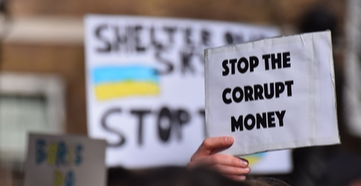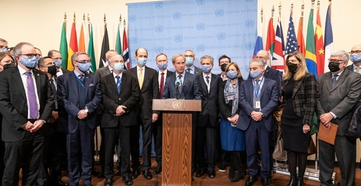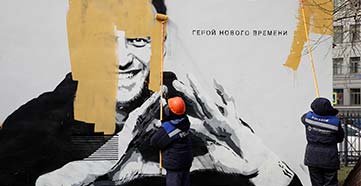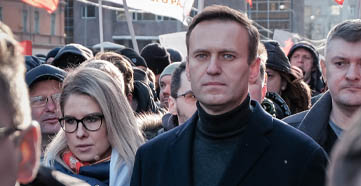Ukraine conflict: Russia’s crackdown on dissent escalates in wake of invasion

The conflict in Ukraine has inflicted immeasurable damage, decimating hospitals and schools, killing thousands of people, and forcing millions to flee the country.
In Russia, government-sponsored propaganda and reticence by both State and local authorities to publish data on losses have so far obscured the true Russian death toll. However, the war’s humanitarian cost within Russia is already emerging.
Rule of law has been in crisis in Russia for decades, but the introduction of two laws recently fast-tracked through the Duma – one criminalising participation in anti-war protests and another banning reporting or disseminating information on the conflict – have accelerated the most draconian crackdown on civil liberties witnessed in the country for more than 30 years.
Clément Voule, the UN Special Rapporteur on the rights to freedom of peaceful assembly and association, says the new legislation has consolidated ‘systematic efforts’ by the Kremlin regime ‘to stifle dissent and further shrink civic space’ in Russia. ‘From the 2014 ‘Foreign Agent’ law amendments to the excessive use of force to disperse peaceful demonstrations, we have witnessed a stark increase in restrictions on the exercise of the rights to freedom of peaceful assembly and of association,’ he says.
The new laws empower the Russian authorities to punish any speech perceived to undermine the military, including describing the conflict with Ukraine as a ‘war’ rather than a ‘special military operation’. Since 24 February, more than 15,000 people have been detained for anti-war actions, according to human rights group OVD-Info.
Whether at anti-war rallies or earlier protests in support of opposition politician Alexei Navalny, Voule says the legislation has given momentum to ‘a broader pattern of the arbitrary arrest and detention of protesters for the legitimate exercise of their right to peaceful assembly.’
In the wake of the new laws, many global news outlets also suspended reporting to avoid facing prison sentences of up to 15 years. Several independent Russia news channels, including Radio Ekho Moskvy and Dozhd, were also forced off air.
On 21 March, a Moscow court banned Facebook and Instagram after designating their parent company, Meta, as ‘extremist’. As Russia's media regulator Roskomnadzor restricts access to other key social media platforms, Voule is concerned the sustained ‘pressure campaign’ on civil society risks eviscerating ‘independent voices’ in the country altogether.
Many Russians continue to use domestic networks such as Odnoklassniki and Vkontakte. Independent media outlets like Meduza have resorted to using Telegram since their websites were blocked inside Russia, but the encrypted messaging platform continues to be dominated by state propaganda sources. ‘It is clear that misinformation is rife, as is propaganda,’ says Mark Stephens, Co-Chair of the IBA’s Human Rights Institute.
Stephens says the authorities’ extensive efforts to suppress dissent and free speech and the sentencing of opposition leader Alexei Navalny on 22 March should be a source of alarm for the international community. Navalny, already in prison on separate charges, was sentenced to nine years for embezzlement and contempt of court. He denies all charges and says they are politically motivated.
We have witnessed a stark increase in restrictions on the exercise of the rights to freedom of peaceful assembly
Clément Voule
UN Special Rapporteur on the rights to freedom of peaceful assembly and association
‘What we see now is a country that confirms its complete negligence for the rule of law and respect for human rights,’ agrees Anne Ramberg, fellow Co-Chair of the IBA’s Human Rights Institute. ‘As I understand Navalny’s lawyers were also initially arrested. Russia has become a cruel and appalling dictatorship.’
Navalny may be one of the Kremlin’s most high-profile targets, but he’s not alone. On 10 March, the Duma introduced a bill to create a new, unified registry of foreign agents. If approved, critics warn this would ramp up the decade-long intimidation tactic used to deter civilians from forming any alleged “association” with an individual or entity on the blacklist.
On 28 March, Novaya Gazeta suspended operations after allegedly violating the country’s ‘foreign agent’ law. The demise of Russia’s last remaining independent news outlet sounded the death knell for media pluralism in the country. It joined Russia’s most respected human rights group, Memorial International and its sister organisation, Memorial Human Rights Centre, which were forced to close their doors in December.
Since 2012, this law has seen the dismantling of more than 400 individuals, media outlets and organisations, according to independent civil society group Inoteka. The European Court of Human Rights (ECtHR) has been investigating claims that the law violates human rights since 2017.
On 16 March, the Council of Europe announced it was expelling Russia after 26 years following its invasion of Ukraine. However, in a statement it confirmed that the Court would continue to ‘deal with applications directed against Russia in relation to alleged violations’ of the European Convention on Human Rights (ECHR) until 16 September, when Russia officially ceases to be party to the ECHR.
An ECtHR spokesperson confirmed to Global Insight that the ‘foreign agent’ law case is still ‘pending before the Court’. Professor Philip Leach, an expert in human rights law at Middlesex University, says it’s ‘deeply regrettable’ that the ECtHR hasn’t already delivered a judgment on the case. ‘It should've dealt with it much earlier because this is a global issue now,’ he says. ‘It's the targeting of civil society organisations by states on totally spurious grounds, alleging some sort of foreign interference. They're deliberately and cynically targeting dissenting voices.’
The Court issued 232 judgments concerning 741 applications related to Russia in 2021. 219 of these identified at least one violation of the ECHR. Leach, who litigated dozens of cases against Russia at the ECtHR during his time as director at the European Human Rights Advocacy Centre, says a strong judgment is needed now more than ever to reverse the devastating global crackdown on civil society. ‘A strong European court judgment pointing out that this breaches the European Convention on Human Rights and other international human rights standards would be a very important facet in pushing back against this kind of conduct from states.’
Image credit: Homepage of Meduza website on the display of PC, url - Meduza.io. Ryazan, Russia - June 16, 2018. sharafmaksumov/AdobeStock.com




